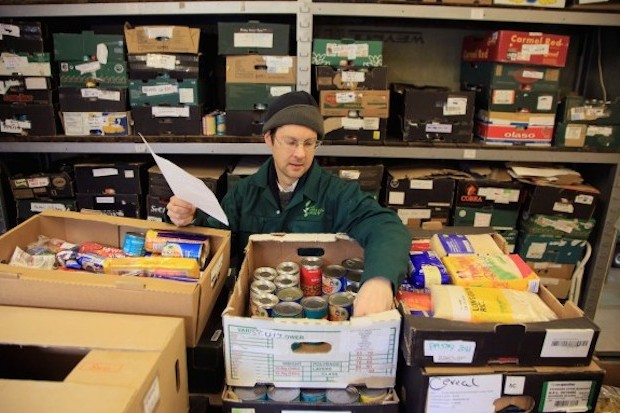This article was corrected. Originally it stated that ‘This tiny organisation doesn’t run a single food bank – it merely advises church and community groups on how to’. But the copy has been changed to reflect the reality of the Trust’s work. The Trussell Trust has responded here.
The Trussell Trust is having a field day. This tiny organisation which runs a food bank in Salisbury and advises and supports a network of over 400 food banks nationwide says there has been a 170% increase in people using food banks in the last 12 months. Of course; that’s because there are more food banks. As anyone with their wits about them can grasp, if you increase the free supply of something worth having, you’ll have takers queuing at the door.
Food bank usage is being equated to poverty. The data are being used as a stick to beat the government, often by well-meaning groups who want to ‘do something’ to help. In reality, they may be perpetuating the problems that brought people to their doorstep in the first place.
The users seem to me to fall into three categories:
1. People with long-term issues, such as addiction, alcoholism and mental illness. They would struggle in prosperity and recession; services for them are frequently atrocious, with long waiting lists. When councils start diverting money from health programmes into food banks, I despair; that’s a total dereliction of duty. Manchester, for example, is spending over £240,000 this year. It’d be better spent on addiction clinics.
2. People with short-term problems, such as debt, or the benefits haven’t arrived. The food bank is for emergencies only, claim operators. In Canada, they thought that over 25 years ago, and now there’s a lot of soul-searching about their role in maintaining people in a hand-to-mouth existence instead of confronting failure and helping them change course. How often do the same faces reappear, claiming their tin of soup?
3. People who are not poor. Benefits levels can be substantial, far more than they might earn, so it’s a rational choice to stay on benefits, and to get the free food. As Fraser Nelson has urged, it’s up to government to tackle this perverse incentive, but easier to say than do. But kindly food bank operators rarely have the resources to visit recipients at home. One imagines they would get as incensed as I do at the well-fed dogs, the obligatory wide-screen TVs, the satellite dishes, the manicures and mobiles – and the car parked outside…Desperate? No, not all of them.
Free food subsidises low wages; it helps support the black economy. It pauperises those it seeks to help. Like giving money to ‘homeless’ beggars on London streets, it encourages more of what it seeks to relieve.
The food banks can have pernicious effects on the local economy. Some Liverpool streets where I grew up have betting shops and pawnbrokers, but no food store. There’s no need for one, if enough local residents get their groceries free. But the closure of a corner shop affects everyone, including those who don’t qualify for the food bank.
The permanent solution to poverty is to raise productivity levels, so that employers can pay more and still survive. That means better education, apprenticeships, and a powerful work ethic, like my immigrant grandparents brought a century ago. It does not come in a food parcel, however much love and compassion comes with it.






Comments